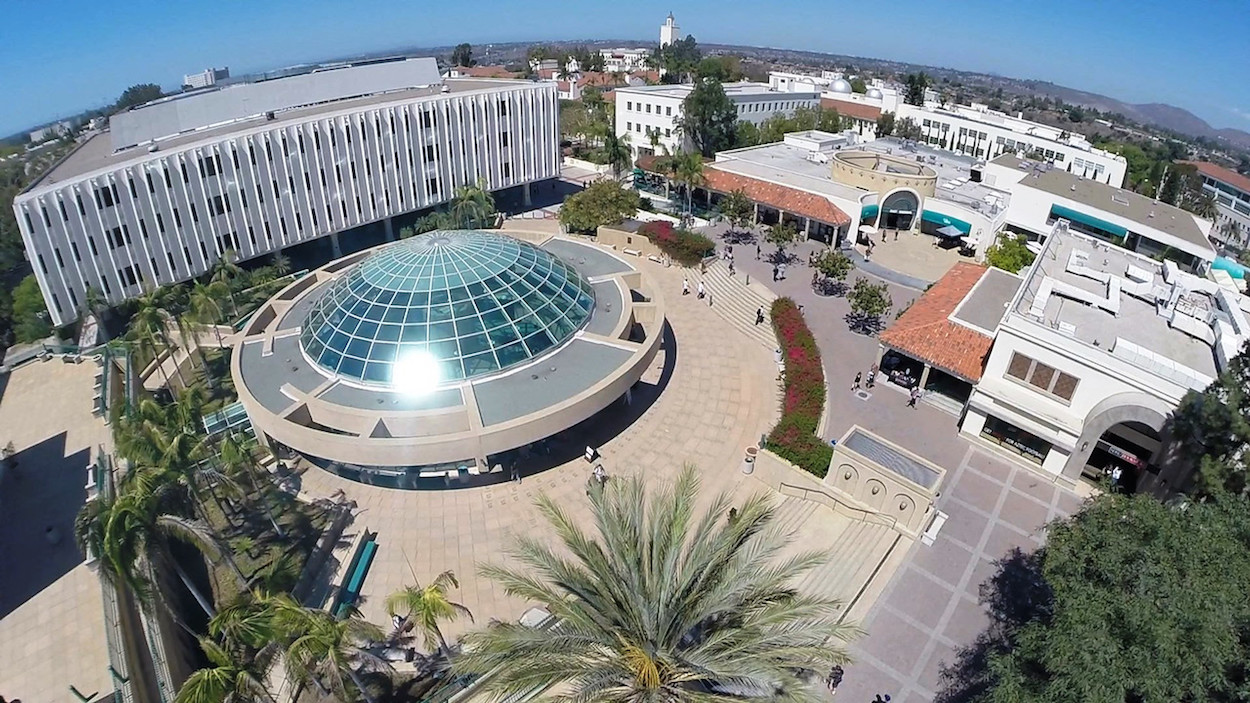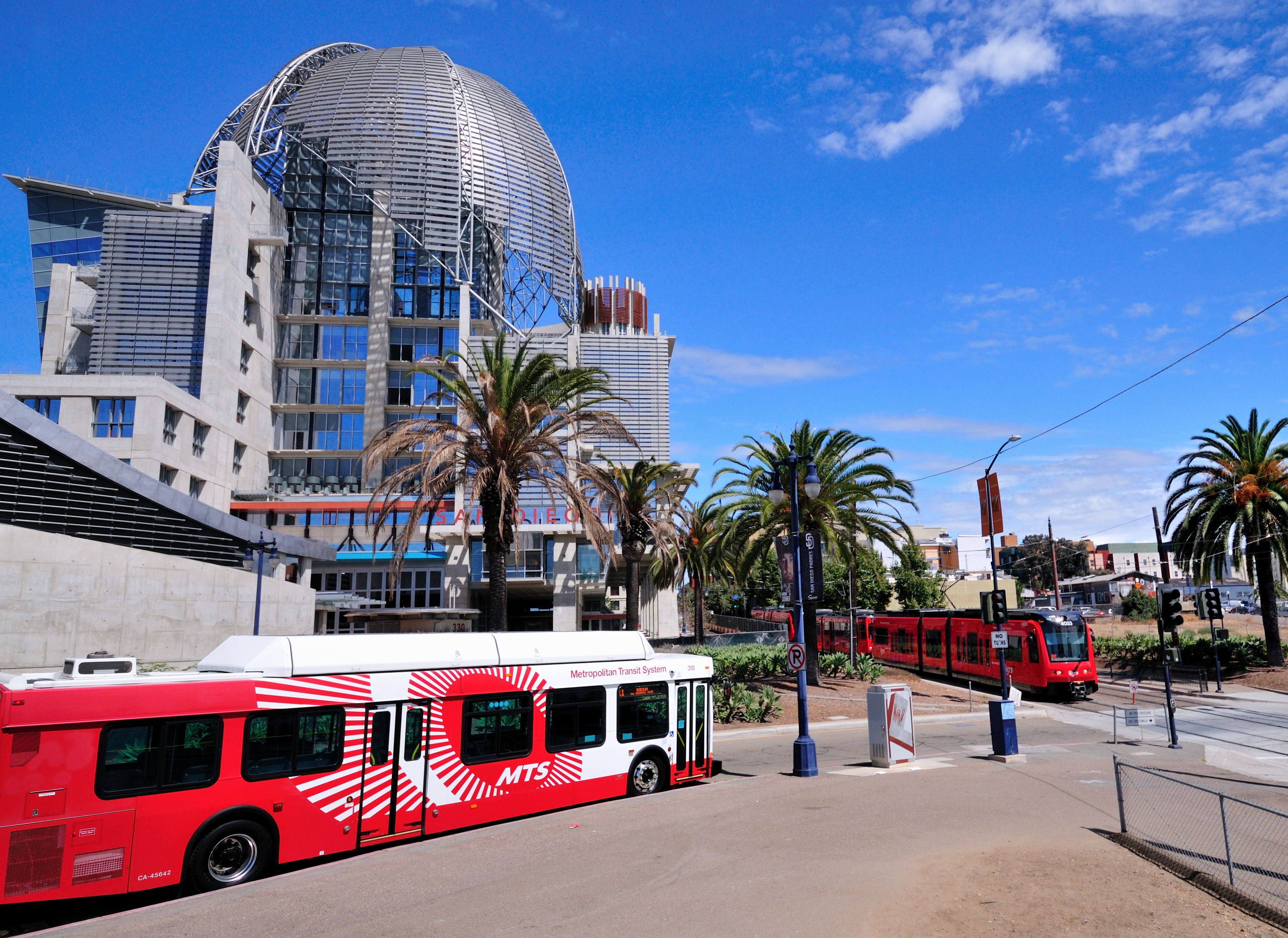Daily Business Report-Nov. 17, 2017
Aerial view of a portion of the SDSU campus (Photo courtesy of SDSU)
Report: SDSU Generates $5.67 Billion in
Economic Activity for the San Diego Region
San Diego State University is a powerful driver of the state and regional economies, generating $5.67 billion in economic activity, supporting 42,000 jobs and creating $2.01 billion in labor income annually, according to a new economic impact analysis.
SDSU’s activities also generate significant tax revenue streams for state and local governments — approximately $457 million annually.
“For 120 years, San Diego State University has been contributing to the economic vitality of the San Diego region,” said SDSU President Sally Roush. “This new report shows that a thriving SDSU is critical to a strong San Diego economy.”
The independent analysis was conducted by ICF, an international consulting firm specializing in economic impact studies. As part of the methodology, the analysis measured:
Direct impacts: spending by the university on operations, plus spending by students; Indirect impacts – spending by suppliers that support the university; Induced impacts – spending of earned wages by university employees and alumni in their communities
The report also found that for every dollar California invests in SDSU, the university returns $35.20 to the economy in the form of direct spending, the economic activity of its students and the impacts of its alumni’s higher lifetime earning power.
Direct SDSU-related expenditures for wages and salaries, operations and supplies, and an array of other items related to SDSU’s educational mission totaled roughly $826 million in 2017. This includes $127 million in annual construction and capital expenditures.
University expenditures support a total of 12,800 jobs per year in San Diego and Imperial Counties, as well as over $524 million in labor income and over $1.35 billion in industry activity.
SDSU’s nearly 35,000 students create a total economic impact of more than $226 million in labor income and drive nearly $618 million in industry activity across the region.
Spending by the university, its students and alumni supports a wide variety of industries in San Diego, including retail, real estate, construction, restaurants, education, transportation and healthcare. The economic impact of SDSU’s alumni reach far beyond their spending, however.
The U.S. Census Bureau estimates that bachelor’s degree holders can expect to earn $1 million more over their lifetimes than workers who have high school diplomas alone. Because university education has a powerful economic impact on individual degree earners, the increased earning power of SDSU graduates is a significant factor in the analysis of SDSU’s economic influence in the region and the state.
Approximately 61 percent of SDSU alumni reside in the San Diego region and 72 percent reside in the state of California. In total, $4.74 billion in incremental wages per year can be attributed to SDSU degree-holders across the state.
The enhanced earning power of SDSU alumni in San Diego supports 23,000 additional jobs and $1.25 billion in additional labor income.
State-wide, the earning power of SDSU alumni supports 27,273 additional jobs, $1.48 billion in additional labor income and $4.35 billion in industry activity. Moreover, SDSU alumni generate $232 million annually in state and local taxes as a result of their increased wages.
Click here to read the full ICF report…
___________________

Wine Industry’s Economic Impact
in San Diego County Put at $30.4 Million
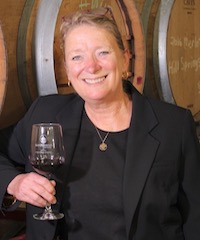
The economic impact of the wine industry in San Diego County is $30.4 million, with total acres of wine grapes harvested more than doubling, crop value growing by 439 percent, and sales at wineries increasing by 88 percent, on average, from 2015 to 2016.
That’s the conclusion of a 16-page report issued Thursday by the San Diego County Vintners Association.
Authored by Vince Vasquez, an independent economic analyst, the report relies on survey data, California ABC licenses and business records to calculate the economic health and expansion of the wine industry in San Diego County.
“Our wine industry has really blossomed and I think a lot of it goes back to the county’s efforts to create a more business-friendly environment for grape growers and vintners,” said Supervisor Dianne Jacob, chairwoman of the county Board of Supervisors. “The growing selection of local wines is not only great for wine lovers, but for our economy. Our wine industry is definitely on the map now.”
The number of wineries in the county has swelled to 116, stretching from North County to the Mexican border. The proliferation of new wineries follows passage of the 2010 San Diego County Wine Ordinance, which eliminated the need for most wineries to obtain a major use permit. Last year alone county wineries and vineyards generated about $23,873,100 in gross sales and $1.1 million in sales taxes.
“San Diego County is rapidly expanding in terms of acres planted, gross sales and varietals produced. There’s a sense there’s something really special going on in our wine community — wines are winning awards and winemakers are coming together to learn and teach each other like never before,” said San Diego County Vintners Association President Linda McWilliams, owner of San Pasqual Winery in La Mesa. “We feel like pioneers, seeing just the tip of growth ahead for the region’s wine industry.”
Click here for the full report.
__________________
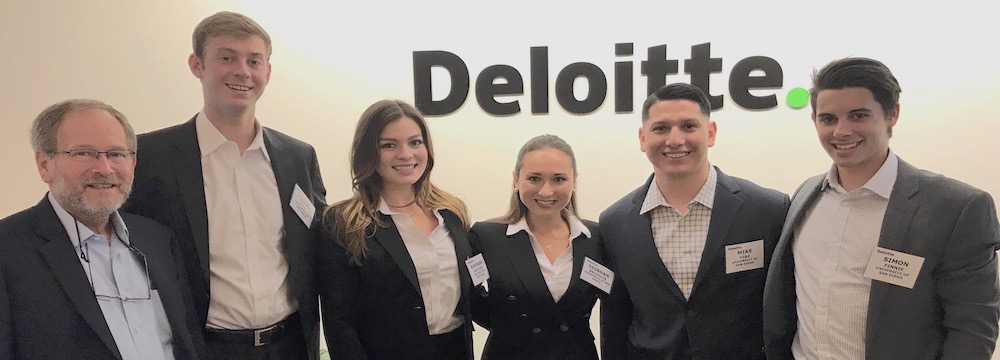
USD Team Named Regional Winner
of Deloitte Tax Case Study Competition
A five-student team from the University of San Diego School of Business was named one of nine regional winners of Deloitte FanTAXtic, Deloitte’s student Tax Case Study competition. Nearly 60 teams representing over 40 colleges and universities participated in the regional event Nov. 3-4 at Deloitte offices across the U.S.
The USD team demonstrated the ability to work collaboratively to solve a complex business case simulation. The team was also recognized for the quality of its overall presentation to a panel of live and virtual judges using the organization’s video conferencing capabilities.
From Jan. 12-14, 2018, the USD team will compete for more than $50,000 in individual scholarships and institutional awards at the Deloitte FanTAXtic national competition taking place at Deloitte University, Deloitte’s national learning and leadership development center near Dallas, Texas.
Sponsored by Deloitte Tax LLP and supported by the Deloitte Foundation, Deloitte FanTAXtic is designed to educate and prepare the next generation of tax talent for a career in business and tax. The interactive program includes case simulation, role playing and presentations.
__________________
Rady School Ranked 1st in San Diego
in Bloomberg Businessweek MBA Ranking
The Rady School of Management at UC San Diego was ranked 1st in San Diego for its full-time MBA program by Bloomberg Businessweek for the third year in a row. The school also ranked 6th in California and 73rd nationally.
Bloomberg Businessweek ranks business schools based on data from five sources: employers who recruit MBA candidates (35 percent), full-time MBA alumni (30 percent), graduating MBA students (15 percent), and employment placement (10 percent) and compensation (10 percent) data provided by the schools. The Rady School ranked 23rd in the alumni portion of the ranking, which measures compensation increase, job satisfaction and the opinion of alumni regarding their MBA experience.
__________________
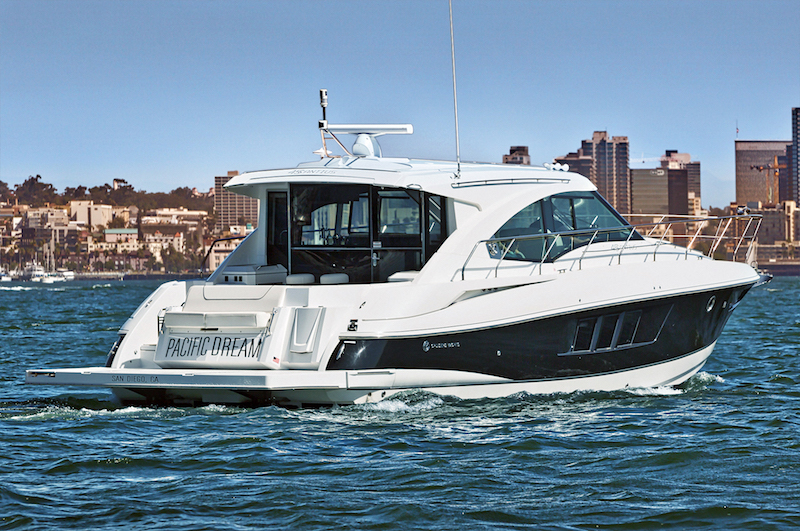
Downtown Tower Residents
Offered Boat-Share Program
Downtown’s Pacific Gate by Bosa residential tower is offering residents an unusual amenity — a boat share program, complete with a captain. The Pacific Dream, a 45-foot Cruiser Yacht, that is available for all residents of the new 215-residence building.
Pacific Dream offers amenities for entertaining, such as wrap-around seating that fits up to 10 people. There is a master stateroom with a queen bed and a second stateroom with settee, side lounger seats with footrests that convert to an additional sleeper, for those entertaining multiple guests or for residents who have children. The boat is also equipped with two private bathrooms with showers.
Units are still available for sale, with move-ins in early 2018.
__________________
SANDAG Refinances Toll Road Debt
SANDAG, operator of the South Bay Expressway toll road, refinanced its outstanding loans by securing a more conservative level debt service structure that will save more than $147 million over the life of the 26-year loans, the agency said. This equates to $88 million in present value.
The financial strategy comes in the same month that the State Route 125 toll road, South Bay Expressway, celebrates a decade in service. SANDAG purchased the Expressway for $351 million in December 2011 from creditors following a bankruptcy. The ten-mile toll road improved mobility in and from the South County.
Within months of the purchase, the SANDAG Board of Directors lowered toll rates up to 40 percent to relieve traffic congestion on arterial roads in eastern Chula Vista and on the southern portion of Interstate 805, making it possible to forego widening of a portion of I-805.
__________________
Undercover Auto Theft Operation Busts 60
Sixty defendants have been indicted as a result of “Operation Kill Switch,” an eight-month vehicle theft crackdown, the District Attorney’s Office announced Thursday. The undercover operation was conducted by the San Diego County Regional Auto Theft Task Force, working with Homeland Security Investigations and Naval Criminal Investigative Service.
“Dozens of car thieves have been shut down as a result of this operation, thanks to the excellent work done by RATT and its law enforcement partners,” said District Attorney Summer Stephan.
Beginning in February and ending in September, undercover officers purchased stolen vehicles, narcotics, body armor and firearms from more than 90 individuals. A San Diego County Grand Jury was presented with evidence of the purchases and returned indictments on 60 people. The defendants, some of whom worked as organized crime rings, face various felony charges vehicle theft, residential burglary, possession of stolen property and illegal weapons possession.
__________________
Personnel Announcements
Natasha Montazeri Named Development
Director for SEAL Family Foundation

Natasha Montazeri has been named development director for the SEAL Family Foundation, a San Diego-based nonprofit organization that raises awareness and funds for special programs in direct support of the Naval Special Warfare families on a local, national and global scale. Montazeri will lead development efforts and will be responsible for the organization’s corporate, foundational and annual giving programs.
Prior to joining the foundation, Montazeri was the senior development manager for The New Children’s Museum in Downtown San Diego for more than two years. Prior to that she managed the corporate development efforts for the San Diego Museum of Art from 2013 to 2015. Montazeri began her development career in 2012 when she returned to the United States from England and accepted a development associate position for the NICU at UC San Diego’s Health Sciences Center.
Montazeri received a Master of Arts degree in Education from Roehampton University, London, England and a Bachelor of Arts degree in Communication from the University of Oklahoma.
The SEAL Family Foundation will hold is Families First San Diego Dinner Gala on April 14, 2018 at the Manchester Grant Hyatt in Downtown San Diego.
__________________
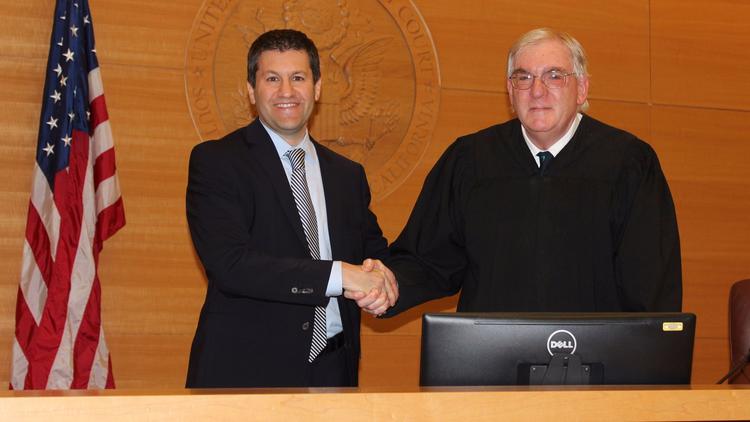
Adam Braverman Sworn In as U.S. Attorney
for the Southern District of California
Adam L. Braverman, a veteran prosecutor who has spent a significant part of his government career pursuing large-scale international drug trafficking cartels, took the oath of office Thursday to become U.S. Attorney for the Southern District of California following his interim appointment by Attorney General Jeff Sessions.
“It is an honor and privilege to be asked to lead an office that is so close to my heart,” Braverman said. “I intend to support all the excellent work that is underway in this office, and also to pursue new, comprehensive, long-term solutions to our most challenging issues – particularly those crimes committed by transnational criminal organizations.”
Braverman, a native of Columbus, Ohio, has been a federal prosecutor in San Diego since 2008. He was most recently deputy chief of the Criminal Enterprises Section, which investigates and prosecutes international and domestic narcotics trafficking organizations and criminal street gangs.
During his tenure as an Assistant U.S. Attorney, Braverman led one of the Department of Justice’s most successful investigations and prosecutions of the Sinaloa Cartel, which resulted in the indictments of more than 125 people, including the command and control structure of the Sinaloa Cartel.

